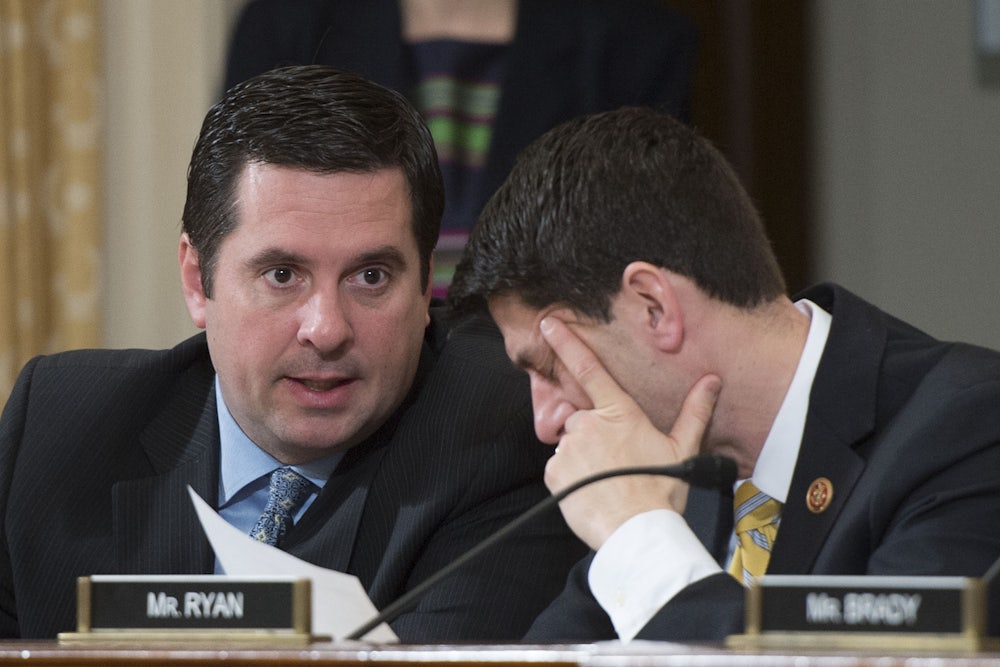The relationship between President Donald Trump and his allies in Congress is rooted less in a simpatico bond than in a particularly ugly kind of transactional politics.
As is often the case when Trump strikes a deal, his side of it comes first: Republicans tolerate his racism, ignore his corruption, laugh off his erratic behavior, and in exchange he leaves the core of the party’s domestic agenda unmolested. He nominates originalists to the Supreme Court; he breaks all his promises to voters by letting Speaker Paul Ryan set social and economic policy.
Notwithstanding the mythical powers Republicans ascribe to cutting high-income taxes, the terms of the arrangement still leave the country vulnerable to humiliation and grave dangers. Back in November, I argued that this transaction set us in a race against time: Could Republicans squeeze what they wanted out of Trump’s presidency quickly enough to spare the organs of U.S. democracy from fatal damage?
That analysis stands, but may have overestimated Republican competence and underestimated Trump’s toxicity.
Four months later, the devil’s bargain between Trump and the GOP is showing signs of strain. It may come apart before the party has any reward to show for it.
On Wednesday, House Intelligence Committee Chairman Devin Nunes confused all of Washington by announcing—with a bizarre sense of urgency—that Trump officials (perhaps Trump himself) had been incidentally captured on legal foreign intelligence surveillance intercepts. His revelation was at once unsurprising (Trump and his associates were known to hold unsecured telephone calls with foreign leaders and agents during the transition period) and also quite likely classified. After alerting the press, Nunes rushed to the White House to brief Trump, allowing Trump to claim vindication for the completely unrelated and discredited claim that former President Barack Obama had wiretapped him during the election—which, it seems, was the whole point of the stunt.
At the very least, Nunes reminded the world why he can’t be trusted to oversee an investigation of Russian interference on Trump’s behalf in last year’s election. His actions led to renewed calls for a non-partisan inquiry, or for him to relinquish his chairmanship. Nunes’s Democratic counterpart on the committee, Representative Adam Schiff of California, issued a statement implying in so many words that Nunes had pantsed himself and handed his britches over to the naked emperor.
Also on Wednesday, the Republican health care bill—which would provide America’s wealthiest with hundreds of billions of dollars in tax cuts, while stripping health insurance from millions of elderly and poor citizens—was losing support, raising speculation that it won’t have enough votes to pass in the House Thursday evening, as scheduled.
At a glance, these two storylines are unrelated, but they are actually snapshots of both halves of the devil’s bargain, neither of which is holding up very well.
Trumpcare may yet pass the House and become law, but not because most Republicans like the bill. It is, according to at least one Republican, the most reviled piece of legislation on Capitol Hill in recent memory. Trump and GOP leaders are thus using both concessions and open threats to sway implacable members, prompting outright defiance from the Koch brothers—the influential right-wings billionaires—who are reportedly pledging substantial financial support to those who vote “no.” Pressure from Trump might scare the requisite number of reluctant members into voting “yes.” Just as feasibly, though, it might motivate them to band together in opposition. Unlike many collective action problems, this one has an easy solution.
If Trumpcare dies (in the House Thursday night, or in the Senate next week), congressional Republicans will have to reckon with the possibility that their bargain with Trump is unraveling, and that they’re getting stiffed. Some of the difficulties Republicans are encountering in the health care process will surely spill over into their grander project of cutting taxes. “Without this bill, I don’t know how you do tax reform,” one Republican congressman told the New York Times.
Meanwhile, Trump’s cover is in danger of wearing thin. The Republican appetite for his antics will weaken if their agenda falters. Which key Republicans would be willing to debase themselves as faithfully as Nunes did if Obamacare repeal is a dead letter? If the FBI’s investigation of Trump’s campaign continues to dominate headlines, who will volunteer to be Trump’s human shield until the tax cut process really gets moving?
Without loyalists in Congress, Trump’s presidency would crumble, but he would have pocketed at least some spoils, at great cost to his party and the nation. The classic devil’s bargain is an exchange of soul for real but fleeting fortunes. At this point, Republicans will be lucky if it turns out their deal was with a devil who can make good on his end, rather than an impostor who cannot.
